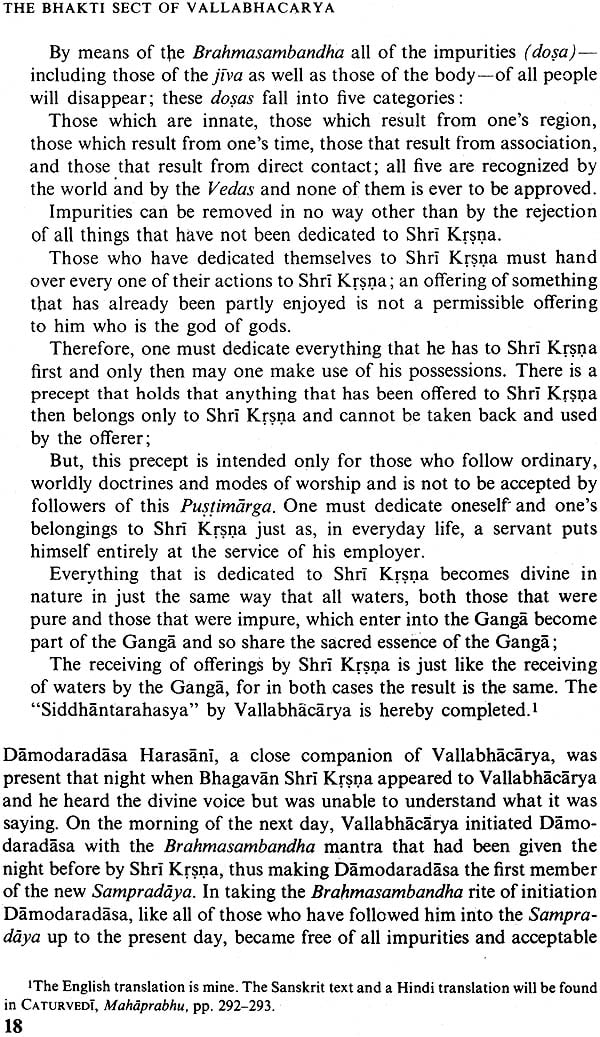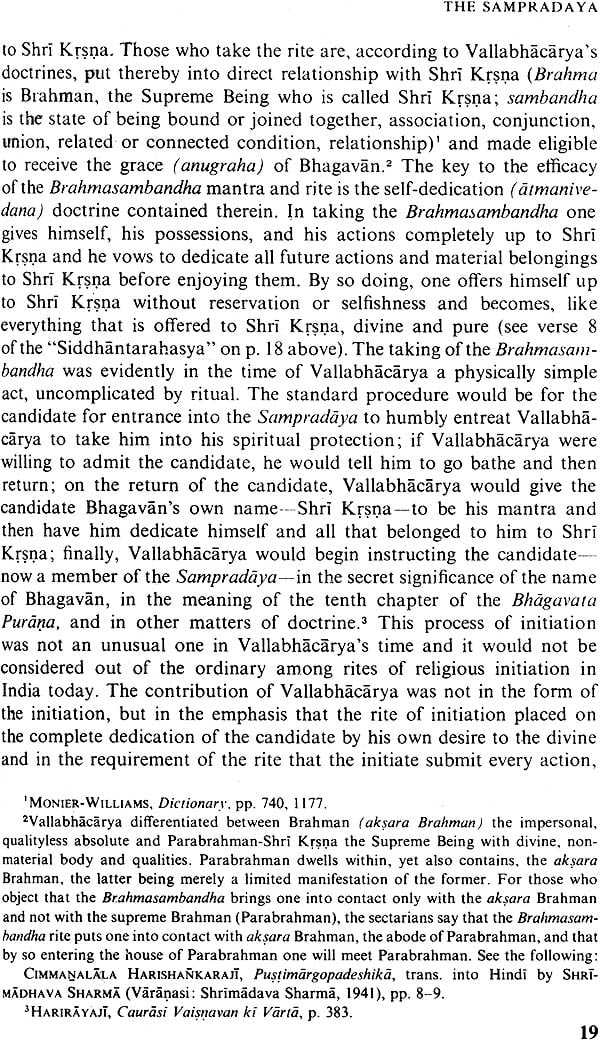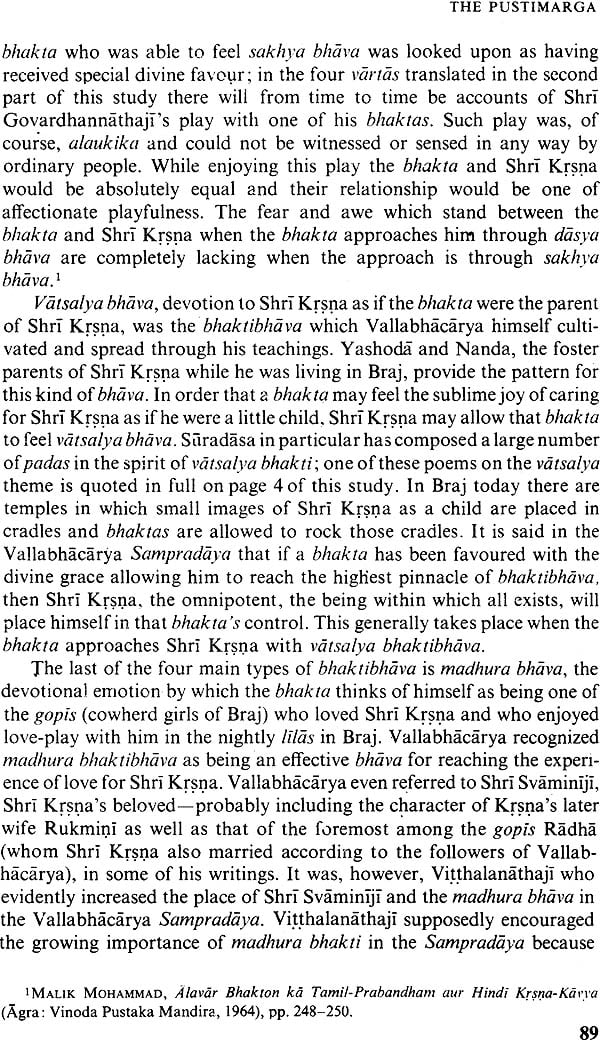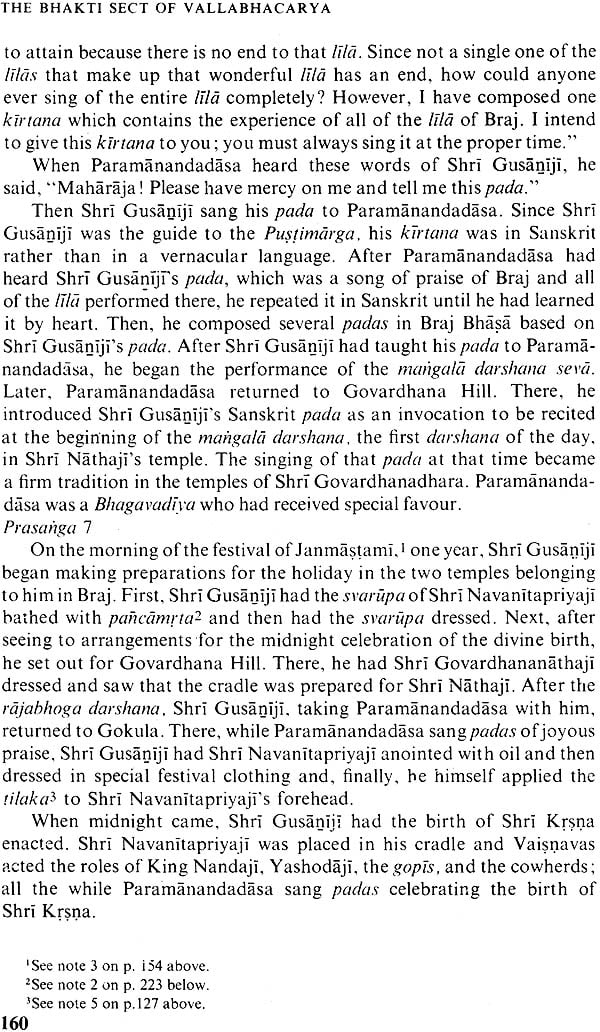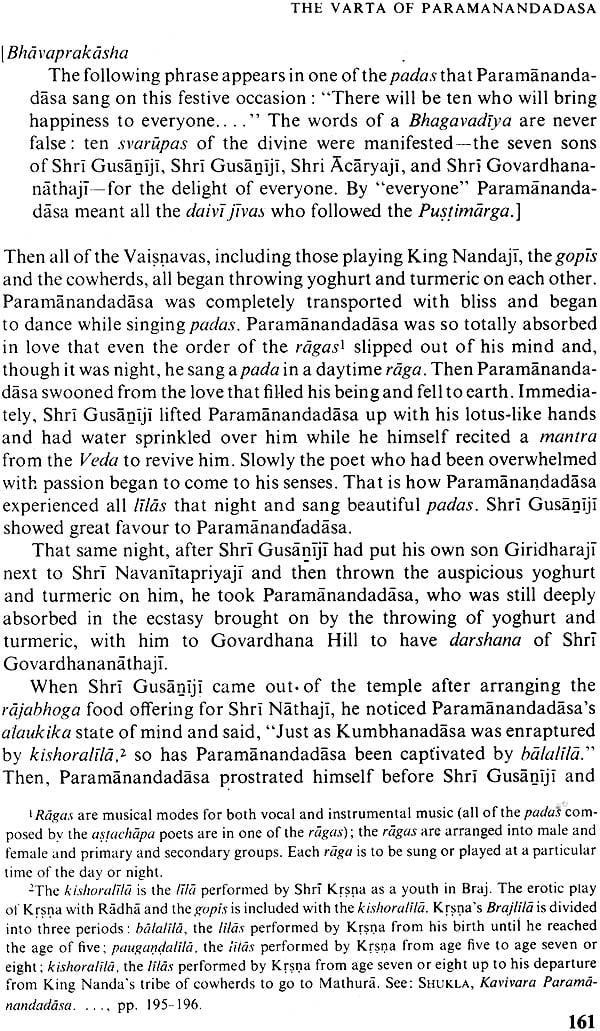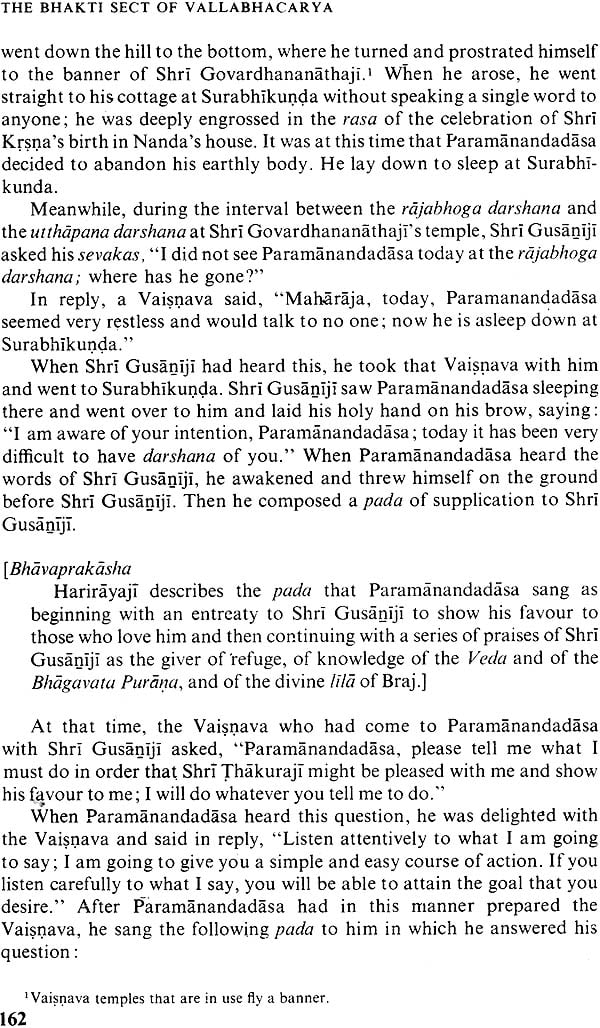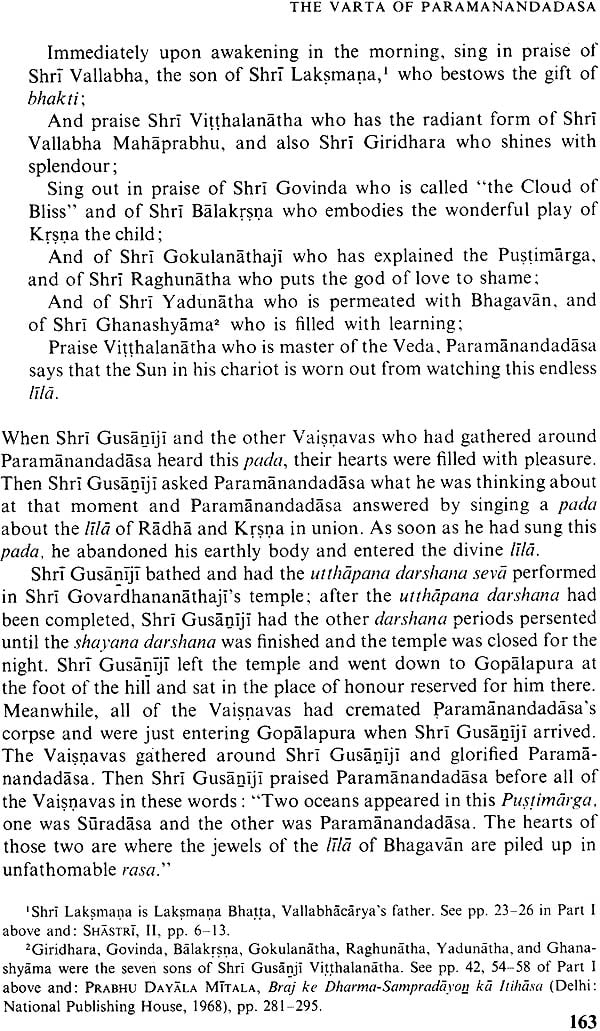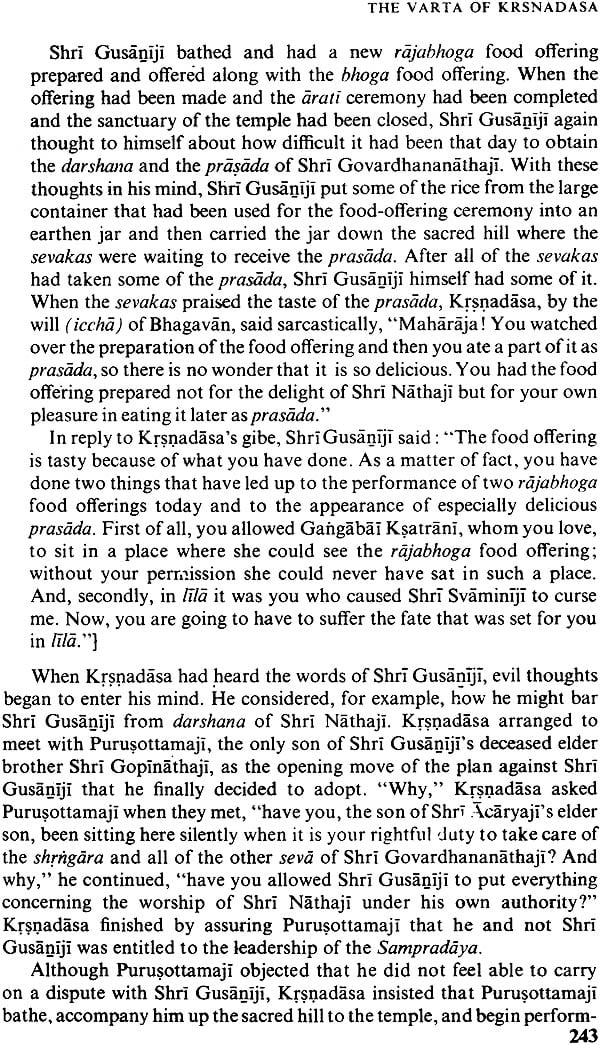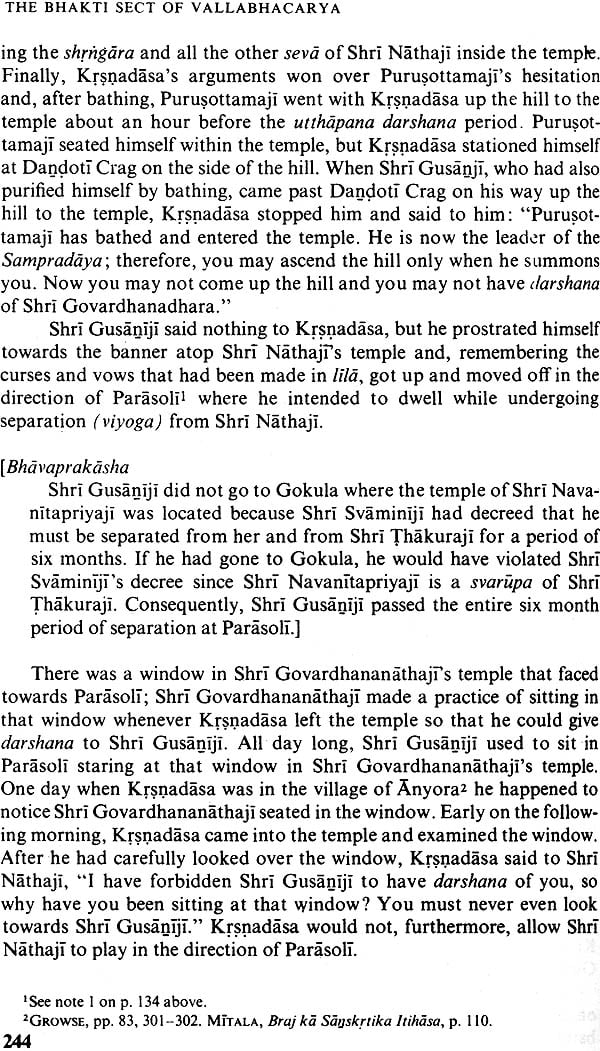
The Bhakti Sect of Vallabhacarya
Book Specification
| Item Code: | IDC081 |
| Author: | Richard Barz |
| Publisher: | MUNSHIRAM MANOHARLAL PUBLISHERS PVT LTD |
| Language: | English |
| Edition: | 2021 |
| ISBN: | 8121505761 |
| Pages: | 272 |
| Cover: | Hardcover |
| Other Details | 9.0 |
| Weight | 450 gm |
Book Description
About the Book:
One of the foremost leaders of the devotional revolution which swept through Hindu society in the 15th and 16th centuries was Vallabhacarya. In terms of religion, Vallabhacarya's main contribution was his demonstration of the way in which a human being can shed his or her limited, mortal ego in order to rediscover an eternal individual participation in an unlimited divine being. With regard to literature, some of the earliest prose writing in any form of Hindi was produced by Vallabhacarya's followers in the Caurasi Vaisnavan ki Varta, a collection of accounts of personal efforts to apply the teachings of Vallabhacarya to everyday life.
The first part of the Bhakti Sect of Vallabhacarya deals with Vallabhacarya's life and with his establishment of an organization for his followers, a philosophical system to explain his view of the world and a spiritual method for putting his teachings into practice. The second part of the book is made up of an English translation of the sections of the Caurasi Vaisnavan ki Varta describing the lives of four early disciples of Vallabhacarya, one of whom was the poet Suradasa.
About the Author:
Dr. Richard Barz has been teaching courses in Hindi language and literature, including Brajbhasha and Avadhi, and in Vaishnava Hindu literature and philosophy since 1968. Currently Senior Lecturer at the Australian National University in Canberra, he has also taught at the University of Melbourne, the University of California at Berkeley and California State University at Long Beach. He first became interested in the thought of Vallabhacarya in 1963. Three years later he was able to spend two years in India, mainly in Mathura and Bombay, in close association with scholars within the movement established by Vallabhacarya. In 1971 he received a Ph.D. in Hindi from the University of Chicago with a thesis on the early history of that movement. In addition to his interest in Vallabhacarya, he has also carried out research in overseas Hindi in Fiji and Mauritius, in Hindi folk literature in central Uttar Pradesh and in contemporary Bhakti Hindu organizations both within and outside of India. He has written extensively on all of these topics.
The Beginnings of this book, which originates from my doctoral dissertation to the Department of South Asian Languages and Civilizations at the University of Chicago, lie in a series of courses in the literature of Braj Bhasa and related Hindi dialects which I took under the direction of Professors S.M. Pandey, D.P.S. Dwarikesh, and Norman H. Zide at the University of Chicago during the years 1963-1966. Through those courses I was first introduced to the Caurasi Vaisnavan ki Varta, the text upon which this study is based. Further progress would have been impossible without the Fulbright-Hays-National Defence Foreign Language Fellowships which I received for study in India. Among the scholars and bhaktas with whom I was able to meet in India, I owe especial thanks to Dr. Govardhannath Shukla and Dr. Vishvanath Shukla, both of the Department of Hindi, Aligarh Muslim University and Mr. Shyam Manoharji Goswamy of Bhuleshwar, Bombay. With the aid and encouragement of Professors K.C. Bahl, J.A.B. van Buitenen, Pramod Chandra, Edward C. Dimock, A.K. Ramanujan, and N.H. Zide, all of the University of Chicago, the study was brought to its present form. These acknowledgements would not be complete without thanks to my wife Kari for her unselfish help both in the United States and in India.
Chapter
Vallabhacarya, His Teachings and His Sect
- Preface
- Introduction
- The Sampradaya
Birth and Childhood of Vallabhacarya
Vallabhacary's First Pilgrimage and the Establishment of Shri Govardhananathaji
Vallabhacarya's Marriage and the Effect of His Marriage on His Sampradaya
The Shastrartha at Vijayanagara
Seva in Vallabhacarya's Sampradaya
The Family of Vallabhacarya - The Shuddhadvaita
The Place of the Shuddhadvaita among Indian Philosophical Systems
Fundamental Doctrines of the Shuddhadvaita - The Pustimarga
The Dosa and Their Removal
The Significance of Pusti in Vallabhacarya's Though
Posanam Tadanugrahah BhavaPART II Four vartas From the Caurasi Vaisnavan ki Varta
- Introduction
Braj Bhasa
The Caurasi Vaisnavan ki Varta
The Dates of Suradasa, Kumbhanadasa, Paramanandadasa and Krsnadasa - The Varta of Suradasa
- The Varta of Paramanandadasa
- The Varta of Kumbhanadasa
- The Varta of Krsnadasa
Bibliography
Index
Table of Transliteration


